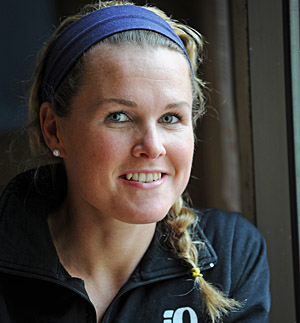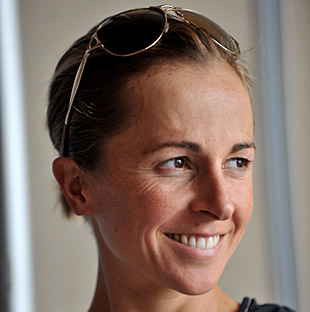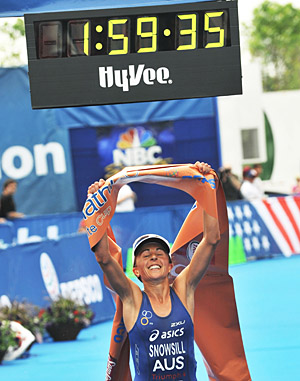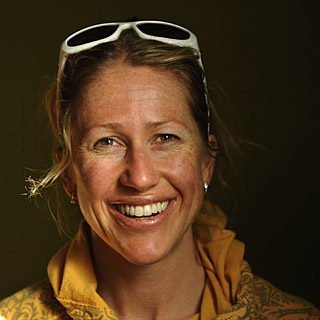Commonwealth Games tri
The third Commonwealth Games Olympic distance Triathlon will commence Thursday July 24 at Strathclyde Park in Glasgow, Scotland.
This event is for elite triathletes from countries that comprised the former British Empire and include England, Scotland, Wales, Northern Ireland, Canada, Australia, New Zealand, South Africa and Bermuda as well as countries such as Kenya, Zimbabwe and Nigeria from Africa; India and Hong Kong from Asia; Jamaica and Bahamas from the Caribbean.
As this is primarily an athletic party for English-speaking countries with historic links to British rule, most major European, Asian, South American and African countries are out. The United States, which was a former British colony but had the bad manners to win a war of independence, is no longer in the club.
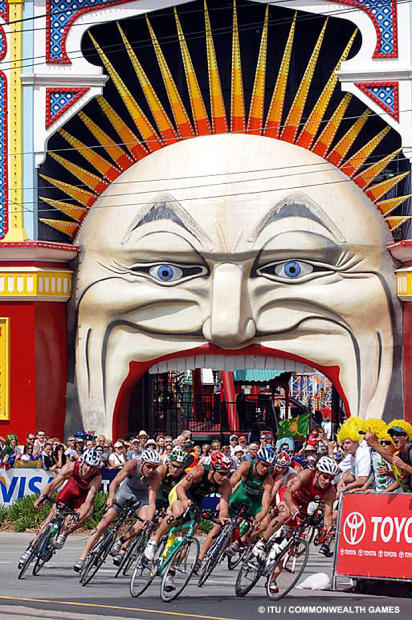
Outside of the global importance of the Olympic Games, the Commonwealth Games Triathlon is among the most prestigious in the sport as it includes nations and athletes who have won the most ITU World Championship and Olympic medals. Like the Olympics, there is a lot of pomp and medals — but no cash on the line.
While the Commonwealth Games have had exciting clashes in old line, mainstream sports such as track and field, most notably the Roger Bannister-John Landy duel at the mile in the 1954 Empire Games (previous title) in Vancouver, much of the prestige of its triathlons have come from the hall of fame quality of its medalists.
In the first Commonwealth Games Triathlon in 2002 in Manchester, England, Simon Whitfield of Canada, the 2000 Olympic champion, won men’s gold. Miles Stewart of Australia, the 1991 ITU World Champion, took silver, and 2004 Olympic gold medalist Hamish Carter of New Zealand earned bronze. On the outside looking in were 5-time ITU World Champion Simon Lessing of Great Britain (4th) and multiple World Champion Chris McCormack of Australia (5th). Carol Montgomery of Canada won the women's elite title, followed by 4-time World champion Leanda Cave of Great Britain (silver) and 2000 ITU World Champion Nicole Hackett of Australia.
In 2006 in Melbourne, Australia Brad Kahlefeldt of Australia won gold, 2004 Olympic silver medalist Bevan Docherty of New Zealand took silver and 3-time ITU World Champion Peter Robertson of Australia took home bronze. The Commonwealth Games triathlon was lent even more glory by its elite women's winner Emma Snowsill, the 2008 Olympic gold medalist and 3-time ITU World Champion. Samantha Warriner and Andrea Hewitt, ITU World champion medalists from New Zealand, took silver and bronze.
Sadly for the sport, the 2010 Commonwealth Games host country India, with its population of 1 billion mad about ancient cricket but indifferent to the charms of modern day triathlon, could not find the resources to create a triathlon venue.
This year, the competition may not have quite the depth of quality of previous Commonwealth Games Triathlons but it certainly has its stars.
In the men’s contest, Great Britain’s 2012 Olympic medalists Alistair and Jonathan Brownlee have returned to form after early season injuries and are the heavy favorites. The Brownlees, with a keen sense of history, took time off from the prestigious World Triathlon Series races to be rested and ready for Glasgow. Alistair calls it “my target race of the year.” Next in line is Richard Murray of South Africa, who has been a leading contender in the WTS series and has a run that can contest the Brownlee dominance. After this trio, there are perhaps a dozen talents with a shot at a men’s medal and they include Australians Aaron Royle and Ryan Bailie, Canadians Kyle Jones, Andrew Yorke and Matthew Sharpe, New Zealanders Ryan Sissons, Tony Dodds and super cyclist/domestíque Tom Davison as well as Bermuda Olympian Tyler Butterfield.
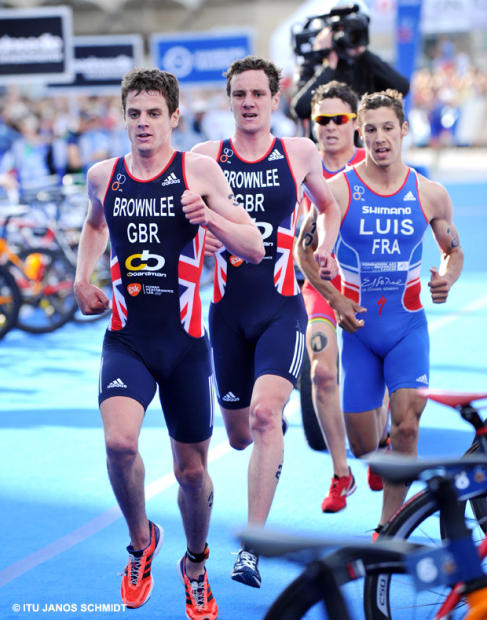
The women's race has a bit more controversy. Beginning the year, Wales was the heavy favorite with defending WTS World Champion Non Stanford and two-time ITU World Champion Helen Jenkins secured the two-competitor allotment for the land of famed drinker and poet Dylan Thomas. However, Stanford suffered an ankle fracture before the season started and Jenkins is a late scratch due to a recent torn plantar fascia.
Leanda Cave, the 2002 ITU World Champion, 2002 Commonwealth Games silver medalist and 2012 Ironman 70.3 and 2012 Ironman World Champion, made a sincere attempt to qualify for the Commonwealth Games this year and won her first two Continental Cups but was ignored by Wales Triathlon officials. While Cave would have made a fine choice as a replacement for her injured compatriots, Wales Triathlon bureaucrats decided to ignore their talented former standard bearer and chose to focus on junior athletes to fill an entry in the mixed relay contest on Saturday.
Team Wales told Wales Online they cannot call up Cave because she was not nominated by Welsh Triathlon.
“I'm prepared to put it on the line for my country and I can't as the selectors didn’t have the foresight to see they should always have a Plan B,” Cave said. “We could have had the best team in the world and we are now down to nothing. I’m almost embarrassed for the Welsh team right now.”
Anne Ellis, president of the Commonwealth Games Council for Wales and chair of the selection panel, said it was the responsibility of each governing body to nominate athletes who met its selection criteria.
“Team Wales has never received a nomination for Leanda Cave from Welsh Triathlon,” she said.
Great Britain’s best is early WTS season leader and 2013 WTS season runner-up Jodie Stimpson, although Stimpson is still coming back to form after a mid-season injury. Next best is 2012 Olympian Vicky Holland. Australians Olympians Emma Moffatt and Emma Jackson as well as Ashleigh Gentle are strong contenders for a medal, as are New Zealanders Andrea Hewitt and Nicky Samuels. Canadian Kirsten Sweetland has almost returned to her world-beating form after years of coping with injuries and countrywoman Sarah-Anne Brault has shown flashes of promise. Also in contention will be Bermuda Olympian Flora Duffy, Ireland’s Aileen Reid, and South Africans Kate Roberts and Gillian Sanders.
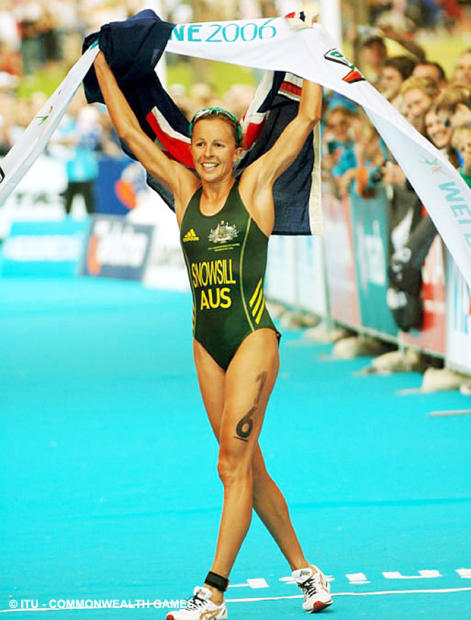
The first Commonwealth Games, originally known as the British Empire Games, included 400 athletes from 11 countries and were held in 1930 in Hamilton, Ontario, Canada. The sports included track and field, swimming, rowing, boxing, wrestling and lawn bowls. Since then, the Commonwealth Games have been held every four years excluding 1942 and 1946. While Triathlon was a late inclusion, it was a popular demonstration event in 1990 won by home country favorites Erin Baker and Rick Wells of New Zealand.
While the Commonwealth Games has tradition going for it, the first international sports festival with a marquee triathlon field was The Goodwill Games founded by U.S. media mogul Ted Turner (also a winning America’s Cup sailing skipper as well as CNN founder). Dismayed by the politics behind the U.S. boycott of the 1980 Olympics in Russia and the Russian boycott of the 1984 Olympics in Los Angeles, Turner invested in an Olympic-style international sports festival he termed the Goodwill Games which began in 1986.
The Goodwill Games included triathlon at the 1994 Goodwill Games in St. Petersburg, Russia, and was won by Simon Lessing of Great Britain and Isabel Mouthon of France. In 1998 at the Goodwill Games in New York City, Lessing and 2004 Olympic silver medalist Loretta Harrop won. And at the final Goodwill Games in 2001 in Brisbane, Australia, Chris McCormack and Loretta Harrop took the honors. Some triathlon experts contend that the success of the Goodwill Games triathlons helped convince the IOC that this new sport was worthy of inclusion in the Olympics.
Finally, for those North and South Americans who might have felt left out by the Brit-centric focus of the Commonwealth Games, triathlon has been a fixture at the Pan American Games every four years since 1995. The first Pan Am Games triathlon champions were Leandro Macedo of Brazil and Fiona Cribb of the United States. Subsequent Pan Am Championship men’s triathlon winners were Gilberto Gonzalez of Mexico (1999), Hunter Kemper of the U.S. (2003), Andy Potts of the U.S. (2007) and Reinaldo Colucci of Brazil (2011). Later women’s champions also include Sharon Donnelly of Canada (1999), Jill Savege of Canada (2003), Julie Ertel of the U.S. (2007) and Sarah Haskins of the U.S. (2011).


